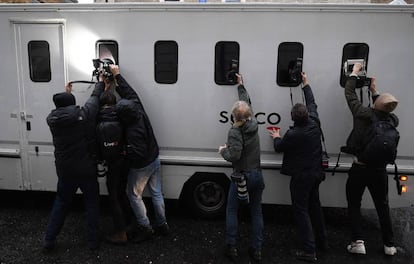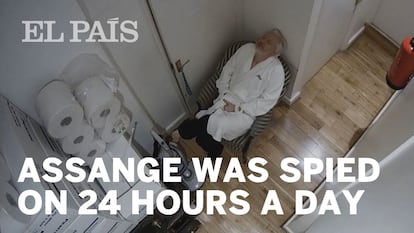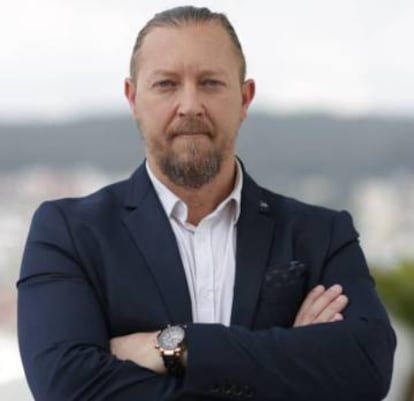Assange suspected a Spanish security firm was spying on him in London
The cyber-activist gave witness testimony before a judge in Spain via videolink, and said he did not authorize anyone to record his conversations with his lawyers


WikiLeaks founder Julian Assange did not authorize a Spanish security firm named UC Global SL, in charge of protecting the Ecuadorian embassy in London, to record the conversations that he had with his lawyers during the seven years that he lived there, according to statements that Assange made through videolink from Westminster Magistrates Court in reply to questions from Judge José de la Mata of Spain’s High Court, the Audiencia Nacional.
Assange was questioned on December 20 as a witness in a case involving alleged violations of client-attorney privilege between the cyber-activist and his lawyers, and allegations that these conversations were passed on to the CIA.
Morales invaded the privacy of Assange and his lawyers by placing microphones inside the Ecuadorian embassy in London
Spanish Judge José de la Mata
In his statements, Assange said that he was not aware of, nor did he in any way aid, the spying that he and his visitors were subjected to, and which this newspaper revealed.
Asked by the prosecutor Carlos Bautista and his lawyer in Spain Aitor Martínez, Assange said that the security cameras at the embassy were changed in late 2017. He said he suspected that he was being spied on by the staff of UC Global SL, and that he asked whether the cameras could capture audio, which he was told they could not.
The 48-year-old Australian activist denied having given the Spanish company permission to pass on to third parties all the information that was being recorded without his consent.
“We’re going to sell everything in the hotel [the embassy] to the American client,” reads an email sent by David Morales, the owner of the security company, to his employees. Morales and his company are being investigated in Spain for violation of client-attorney privilege, among other charges.

“Did you give your consent to having your visitors’ passports photographed, their cellphones opened up and their private correspondence read?” asked Martínez. “Under no circumstances,” replied Assange.
The WikiLeaks founder was transferred from Belmarsh prison, where he has been held since April, to Westminster Magistrates Court, where the videolink interview took place. Dozens of people gathered outside the building demanding his release and rejecting his extradition to the United States, where he is accused of 18 crimes that add up to 175 years in prison in connection with WikiLeaks’ publication of classified material on military operations in Iraq and Afghanistan.
Judge De la Mata questioned Assange after sending a European Investigation Order (EIO) on September 25 requesting assistance from British authorities. As part of the request, the judge said that David Morales, owner of UC Global SL, “invaded the privacy of Assange and his lawyers by placing microphones inside the Ecuadorian embassy in London without consent from the affected parties.” The request also stated that the information thus collected was distributed to other people and institutions, including “authorities from Ecuador and agents from the United States.”

Documents and videos revealed by EL PAÍS in July, months before Assange took legal action against Morales, show that UC Global SL spied on the cyber-activist’s conversations with his lawyers, at meetings where they were designing his defense strategy to avoid extradition to the US. Morales allegedly delivered these and other conversations to US intelligence services, this newspaper revealed. Morales was arrested and released pending trial to face charges of violation of client-attorney privilege and illegal arms possession.
The EIO used by the Spanish judge is a new tool for judicial cooperation introduced in 2018 meant to facilitate transnational investigations, and it represents a step up from the old letters rogatory, which took longer. With an EIO, a legal authority from a EU member state can ask a legal authority from another EU country for assistance in obtaining evidence or means of evidence, including witness statements.
It is an automatic procedure, and requests can only be rejected in exceptional cases. In this particular case, the Spanish judge ran into objections from the United Kingdom Central Authority (UKCA), the body in charge of processing and responding to EIOs. Rashid Begun, who signed the response from the UKCA, demanded more details and, in his first response, questioned the jurisdiction under which Spain claims to be investigating the case.
Assange was questioned for an hour. His defense had asked the judge to keep the questions as short and concise as possible due to his client’s health. The UN special rapporteur on torture has issued a report stating that the WikiLeaks founder is being subjected to “cruel and inhumane” conditions. At the London prison where he is being kept, he is allowed out of his cell for one hour a day, and he is being kept isolated from the other inmates.
English version by Susana Urra.
Tu suscripción se está usando en otro dispositivo
¿Quieres añadir otro usuario a tu suscripción?
Si continúas leyendo en este dispositivo, no se podrá leer en el otro.
FlechaTu suscripción se está usando en otro dispositivo y solo puedes acceder a EL PAÍS desde un dispositivo a la vez.
Si quieres compartir tu cuenta, cambia tu suscripción a la modalidad Premium, así podrás añadir otro usuario. Cada uno accederá con su propia cuenta de email, lo que os permitirá personalizar vuestra experiencia en EL PAÍS.
¿Tienes una suscripción de empresa? Accede aquí para contratar más cuentas.
En el caso de no saber quién está usando tu cuenta, te recomendamos cambiar tu contraseña aquí.
Si decides continuar compartiendo tu cuenta, este mensaje se mostrará en tu dispositivo y en el de la otra persona que está usando tu cuenta de forma indefinida, afectando a tu experiencia de lectura. Puedes consultar aquí los términos y condiciones de la suscripción digital.








































